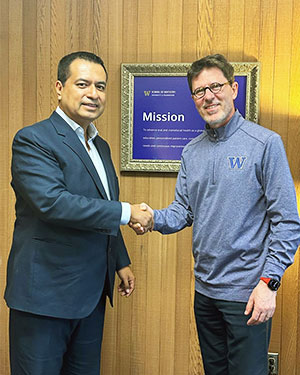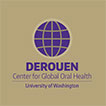In May 2024, Dr. Walter Curioso from Universidad Continental visited Dr. André Ritter, Dean of the University of Washington School of Dentistry, to discuss collaborations between their institutions, in the context of the memorandum of academic exchange subscribed between Universidad Continental and the School of Dentistry at the University of Washington with the objective of increasing cooperation in the fields of education and academic research.

Dr. Curioso is a prominent figure in digital health and medical informatics. He serves as the Vice-Rector of Research and a Professor at Universidad Continental’s School of Human Medicine. With a rich background that includes serving as a Vice Minister of the Ministry of Development and Social Inclusion in Peru and holding an affiliate professorship at the University of Washington, Dr. Curioso has made significant contributions to public health and informatics, focusing on improving healthcare delivery through innovative technologies.
Dr. André Ritter, who has been the dean of the University of Washington School of Dentistry since 2022, has a distinguished career in dental education and operative dentistry. Before his tenure at UW, Dr. Ritter held leadership positions at New York University and the University of North Carolina. He is known for his commitment to advancing dental education and research, fostering international collaborations, and integrating new technologies and methodologies into dental practice. His vision for the School of Dentistry includes strengthening global partnerships to enhance educational and research opportunities for students and faculty.
During their meeting, Dr. Curioso and Dr. Ritter explored avenues for collaboration between their institutions. They discussed joint research initiatives, particularly in the fields of oral health research, research integrity, digital health and dental informatics, and the potential for student and faculty exchange programs. This collaboration aims to leverage the strengths of both universities to advance dental and medical education, improve research outcomes, and ultimately enhance healthcare delivery on an international scale.
